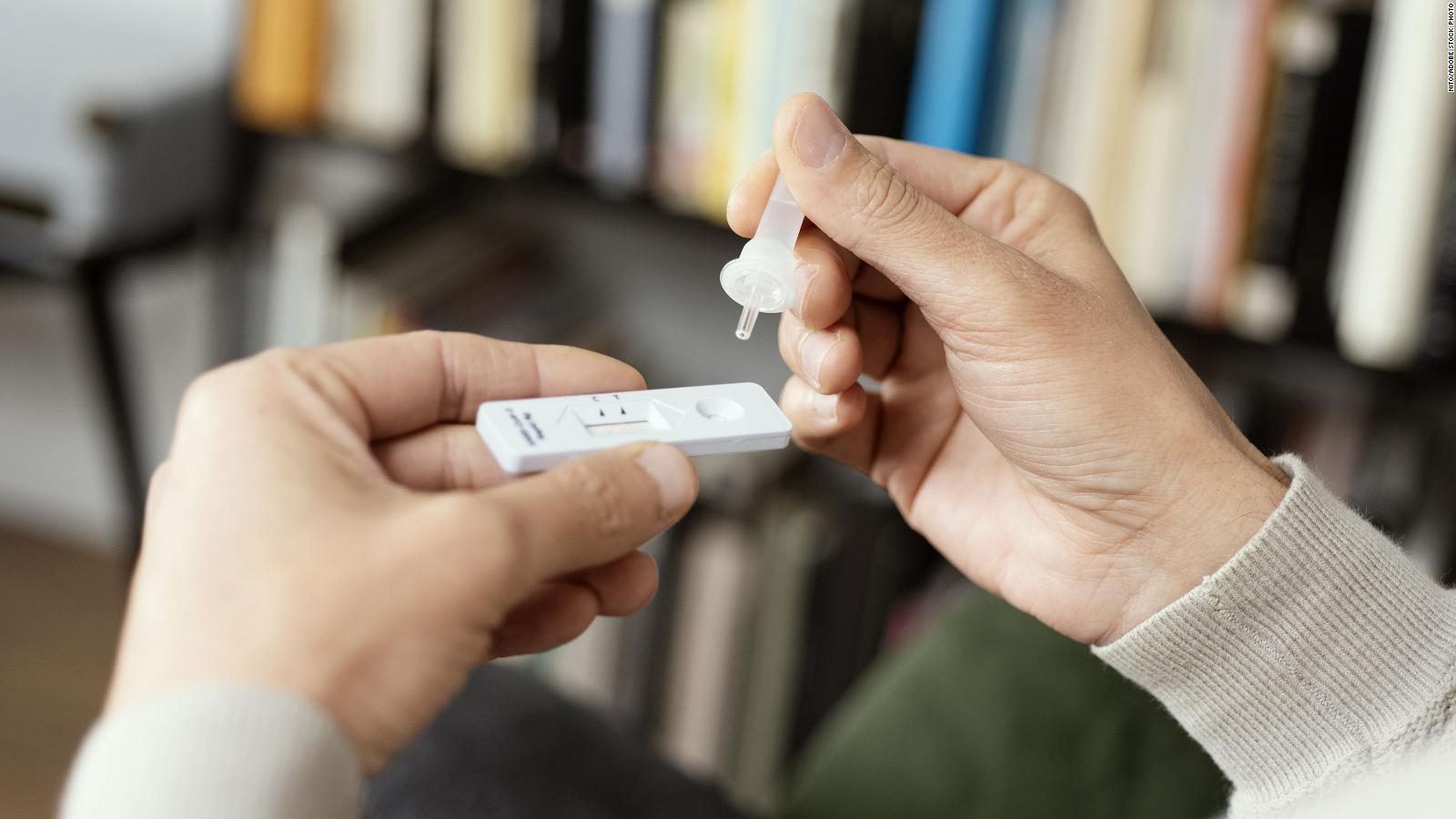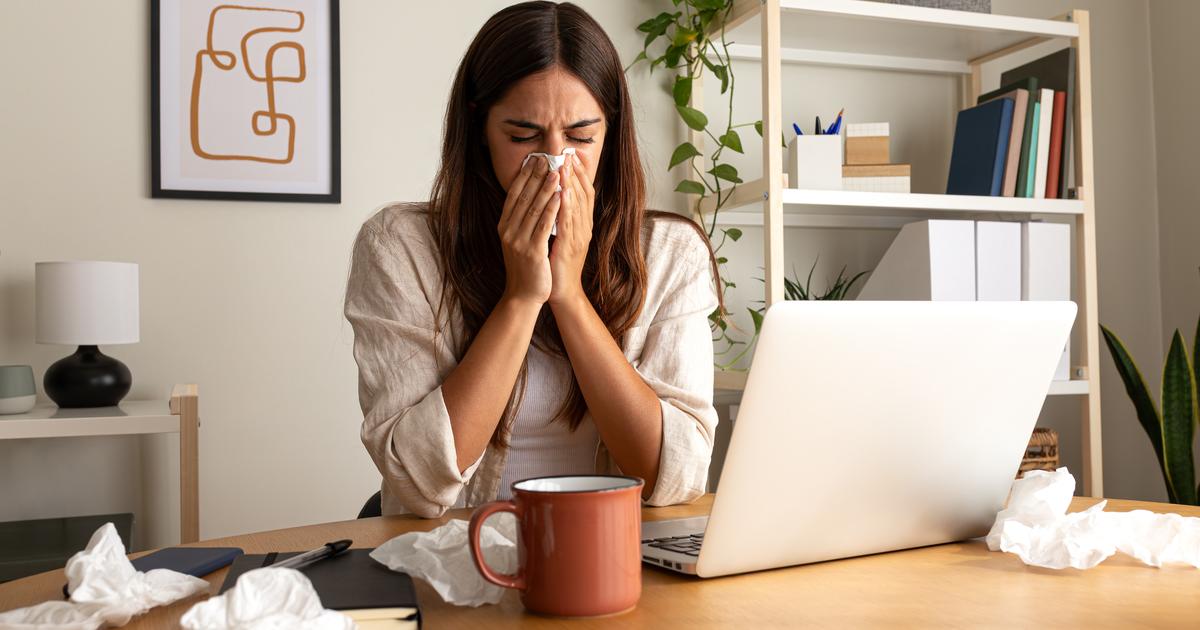What symptoms or effects does omicron cause in children?
1:09
(CNN) -
If you test positive for covid-19, you will be recommended to isolate yourself for between five days and two weeks.
It all depends on where you live.
The United States and the United Kingdom have drastically reduced the recommended periods of self-isolation for asymptomatic people, and more countries may soon follow suit, as the highly communicable variant of omicron threatens to keep hospital staff and other key workers at home. .
In the United States, people can now come out of isolation if they have no symptoms after five days, followed by five days in which they must wear a mask with other people.
Last week, the UK shortened the period to seven days for people who produce two consecutive negative tests.
This is how the omicron variant of covid-19 is affecting children
It comes amid record numbers of cases in both countries, and marks the first time since the omicron emerged that major countries have deviated from the 10-day isolation period recommended by the World Health Organization.
But most countries still follow the 10-day marker, while others, like Germany, require up to 14 days in isolation.
The disparities have led some to wonder exactly when and how long people are infectious with the omicron variant.
advertising
The moves came amid concerns about the availability of key workers.
"If you are asymptomatic and infected, we want people to return to their jobs, particularly those with essential jobs, so that our society can run smoothly," said Dr. Anthony Fauci, director of the National Institute of Allergy and Infectious Diseases, to CNN this week.
Employers lived a very difficult 2021 and now omicron is here: 5 trends to watch in 2022
But there is also some emerging data behind the changes.
The Centers for Disease Control and Prevention (CDC) said its decision was "motivated by science that shows that the majority of SARS-CoV-2 transmission occurs early in the course of the disease. , generally in the 1-2 days before the beginning of the symptoms and the 2-3 days afterwards ".
The differences between allergy, flu, cold and covid-19 2:54
A recent CDC study, published Tuesday, examined a group of patients infected with the omicron variant in Nebraska and found that the time between exposure and infection, known as the incubation period, can be around three days.
That's shorter than the delta strain, which studies have found has an incubation period of four days.
A similar study of a Christmas party in Norway in which dozens of people were infected found comparable results.
"There is accumulating evidence, for vaccinated people, that if we are asymptomatic, it is highly unlikely that we will be infectious after five to seven days," said Brown University Associate Dean of Public Health, Dr. Megan Ranney, to CNN this Tuesday.
Emerging evidence that omicron may be less severe than delta likely played a role in the movements as well.
But the new guidelines have still sparked some debate in the medical community, and experts have yet to fully understand omicron.
January Will Be "A Really Tough Month" As Omicron Variation Feeds New Infections, Expert Says
"For the unvaccinated, the data doesn't really support that you become non-infectious after five days," Ranney said.
"I am quite concerned about these new recommendations."
She suggested having a different guideline for unvaccinated people until more data comes in, which could also have the "added boost" of encouraging people to take the vaccine if they haven't already.
Erin Bromage, a biology professor at UMass Dartmouth, added on CNN Wednesday that "there is absolutely no data that I know of" to support the change in orientation.
He added that people can still test positive for antigens for up to seven to eight days after their initial test, even if they don't have symptoms.
Unlike the UK, where antigen testing is more abundant, the US guidance is not dependent on getting a negative result.
Nonetheless, omicron is rapidly advancing through the workforce in several countries, and more nations are likely to shorten their periods of isolation in the new year if the burden on hospitals increases.
"With the high volume of new cases ... one of the things we want to be careful about is that we don't have that many people," Fauci said.
Some good news regarding omicron
Three studies, one from England, one from Scotland and a third from South Africa, suggested that omicron is associated with a lower risk of hospitalization than the delta variant.
The degree to which this risk is reduced ranged from 40% to 80% in all studies.
That research included preliminary data, and the articles have yet to be published in a peer-reviewed journal.
But they add to growing evidence that the new strain, while highly transmissible, may be less severe.
However, a lower risk of hospitalization could easily be offset by the higher number of concurrent infections that omicron is causing in several countries.
That's why experts urge caution and encourage anyone who hasn't taken the vaccine or booster to do so before omicron takes hold.
How to know if it is covid, flu or cold
Do you have a sore throat, runny nose, and muscle aches?
It could be a common cold, a case of the flu, or Covid-19.
All diseases share similar symptoms, which sometimes makes it difficult to distinguish what is affecting you.
Do home tests detect the omicron variant?
1:09
Covid-19 case rates have risen as the omicron variant has spread, but the number of hospitalizations appears to remain relatively low.
For vaccinated people, evidence suggests that infection with this variant appears less likely to be severe, epidemiologist and former Detroit Health Department executive director Dr. Abdul El-Sayed, former director of the Detroit Department of Health, told CNN. Detroit.
Is it allergy, flu or covid-19?
How do you know the difference?
"The important thing to remember is that a vaccine is like giving a 'wake-up' call to your immune system. Therefore, its ability to identify, attack and destroy viruses is much greater each time we take another dose of the vaccine. "El-Sayed said.
"It makes sense that the symptoms you would experience would be milder if you had been vaccinated."
However, that doesn't mean infections shouldn't be taken seriously, he added, especially when considering the risk of overwhelming healthcare systems.
Many Latin American countries now have higher vaccination rates than Europe and the United States
Many countries in Latin America were affected by a high increase in death rates from covid-19 at the beginning of the pandemic, as the coronavirus spread throughout the region.
Currently, the tide is turning in many Latin American countries, where vaccination rates exceed those in Europe and the United States and help reduce deaths, writes Tim Lister.
The launch of the vaccine was slow at first, and simply having the vaccines on hand was a major problem.
Just six months ago, Latin America and the Caribbean reported just under half of all COVID-19-related deaths worldwide.
While the world is on alert by omicron, so are the vaccination rates against covid-19 in Latin America
Now, the region accounts for about 10% of COVID-19-related deaths worldwide, according to the latest data from Johns Hopkins University.
This is due to the accelerated delivery of European, American, Chinese and locally produced vaccines that several Latin American countries have received in the second half of this year, according to data from the Pan American Health Organization (PAHO).
One of the reasons for the success of these vaccination campaigns can be attributed to history: many Latin American countries have long-standing and reliable national vaccination campaigns against other diseases, such as polio.
Ómicron causes a nightmare on Christmas trips
Several thousand flights have been canceled this week as Covid cases rise around the world.
More than 2,000 trips were canceled on Wednesday, after a series of frustrated trips during the holiday period.
Of the more than 2,800 flights canceled on Monday, about 1,000 were in, to or out of the United States, according to FlightAware.
Almost 11,000 flights are delayed.
Globally, airlines canceled more than 6,000 flights on Christmas Eve, Christmas and the day after Christmas.
In the United States, more than 1,200 flights were canceled and more than 5,000 were delayed on Sunday alone because staff and crew said they were ill.
Thousands of flights canceled on Christmas weekend.
Will the same happen by the end of the year?
Cancellations occur during the busiest time of year for air travel.
The U.S. Transportation Security Administration (TSA) said it screened millions of people each day over the holiday weekend, peaking at 2.19 million travelers on Thursday, December 23. .
This Wednesday, more people passed through the TSA checkpoints than on the same day in 2019.
Isolation Covid-19 Micron









